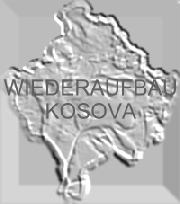Inhalts-Verzeichnis
Kosovo + Kosova = Kosov@
werden vermittelt bei

http://www.osnabrueck.
netsurf.de:8080/~dbein/
wiederaufbau.htm
|
Inhalts-Verzeichnis |
||
|
Kosovo + Kosova = Kosov@ |
werden vermittelt bei 
http://www.osnabrueck. netsurf.de:8080/~dbein/ wiederaufbau.htm |
|
Copy from http://www.fao.org/NEWS/GLOBAL/GW9917-e.htm taken on October 14, 1999
The war in Kosovo: a Special Report assesses the damage
With the fighting over in Kosovo, thousands of families who had fled their homes and farms are returning to a land deeply scarred by war. An FAO/WFP crop and food assessment mission to Kosovo has released a special report that reveals the extent to which the war has devastated agricultural production in the province.
Combines are in short supply in Kosovo as returning farmers try to bring in their harvest
FAO photo/C. Ferrand
The numbers contained in the mission report are grim. The wheat harvest is expected to drop by 65 percent and the maize harvest by nearly 80 percent. Spring and summer vegetable production has been reduced to almost nothing and, according to the report, this year's entire grape crop "can be written off". During the conflict, "widespread looting and slaughter of livestock" was also reported. Nearly half the cattle and some three-quarters of Kosovo's small stock and poultry have been lost.
Kosovar families will face a difficult time trying to recover. The mission points out that the drastic decline in agricultural and livestock production has reduced rural incomes at precisely the time when farming households are in need of extra money to rebuild or make the necessary repairs to damaged buildings and other structures. A shortage of combines for harvesting and the presence of landmines and unexploded bombs in the fields are just two of the many other problems farmers will have to contend with.
The destruction caused by the war in Kosovo has ravaged an agricultural sector already crippled by a decade of repressive policies and neglect by the central government in Belgrade, capital of the Former Republic of Yugoslavia. State-run enterprises had fallen into decline, cooperatives had collapsed and irrigation schemes had become useless as a result of poor maintenance. Kosovo had became increasingly dependent on imported agricultural commodities.
The staple food in Kosovo is wheat, and the report estimates the province's wheat requirement to be 367 000 tonnes. Local production, expected to reach 113 000 tonnes, will account for only 30 percent of domestic needs. Current wheat stocks are estimated at 26 000 tonnes, leaving 228 000 tonnes to be covered by imports. Food aid deliveries and pledges so far account for about 143 000 tonnes. The shortfall of 85 000 tonnes will have to be met through further food donations or commercial imports.
The report did note some positive signs indicating the food security situation is stabilizing in the province. Private sector trade in food, which had flourished in the absence of effective government agricultural support before the war, has resumed quite rapidly. According to the report, markets were well stocked with high quality vegetables from Macedonia and other areas and were available at prices similar to those in 1998. The mission is hopeful that the private sector will soon be able to respond to the local demand for wheat. Nevertheless, given the widespread damage caused by the fighting, the mission report states that, "the timeframe for even an initial recovery is at least one year."
8 September 1999
Related links
- Special Report: Kosovo
- Funds urgently needed for assistance programmes in Kosovo, Albania and Macedonia
- Global Information and Early Warning System on Food and Agriculture (GIEWS)
- Global Watch archive